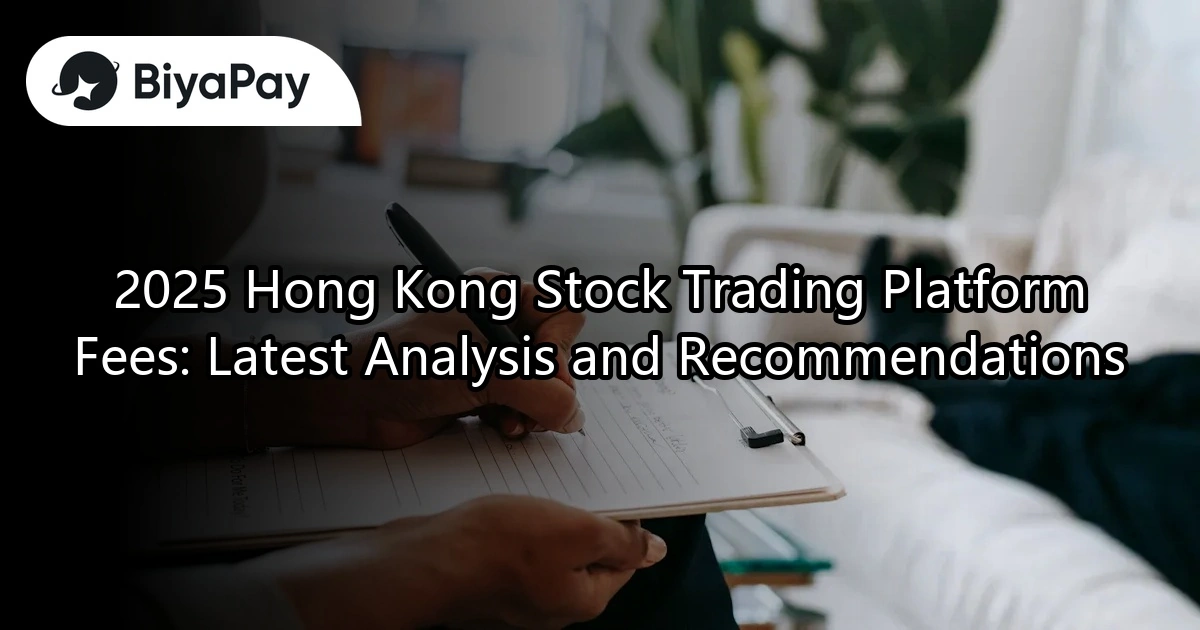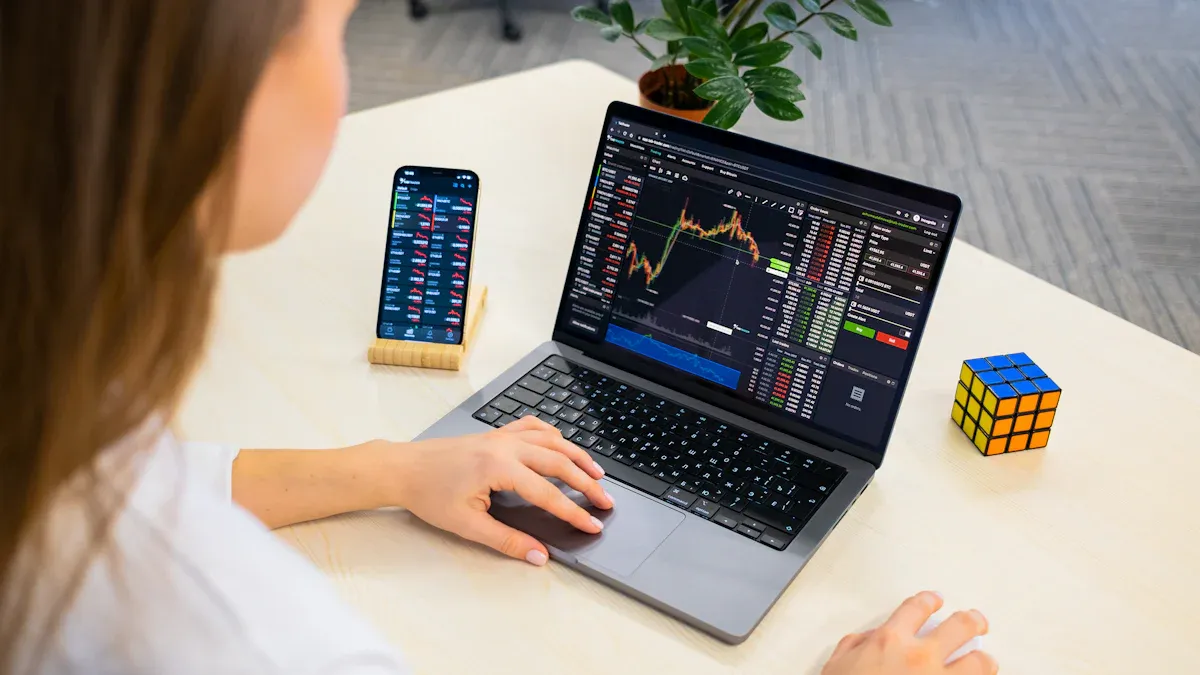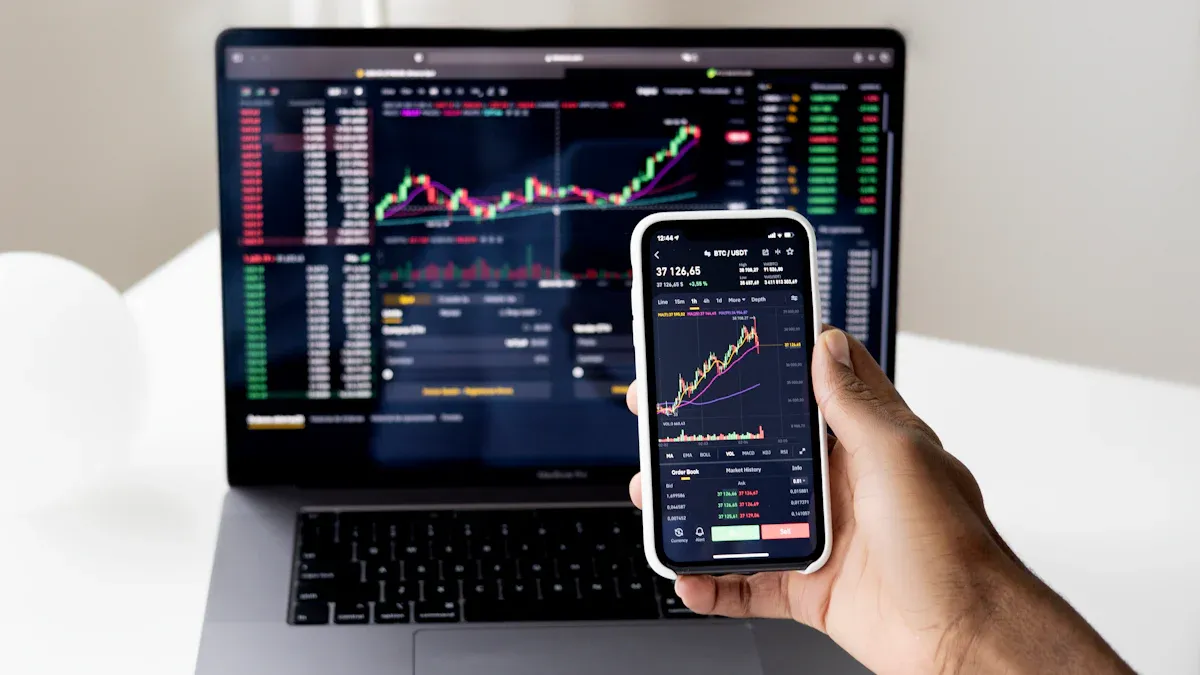- EasyCard
- Trade
- Help
- Announcement
- Academy
- SWIFT Code
- Iban Number
- Referral
- Customer Service
- Blog
- Creator
2025 Hong Kong Stock Trading Platform Fees: Latest Analysis and Recommendations

Image Source: pexels
The lowest-fee options for Hong Kong stock trading platforms in 2025 are digital platforms offering low commissions and transparent fees. You can enjoy lower trading costs and a stable trading experience through these platforms. According to Cathay Securities’ statistics, the number of investors using regular fixed-amount deductions for US stocks has been steadily increasing month by month in the first four months of 2025, with a deduction amount market share of 41%. This indicates growing investor confidence in digital trading platforms, making low-fee Hong Kong stock trading platforms more popular, especially for investors concerned about “Hong Kong stock trading fees.”
When choosing a Hong Kong stock trading platform, you need to consider three key criteria: fees, hidden costs, and trading experience. Fees directly impact your investment costs, while hidden costs may add extra expenses through exchange rate differences or minimum commission requirements. A good trading experience includes stable platform performance and a user-friendly interface, which are factors you cannot overlook when selecting a platform.
Key Points
- When choosing a Hong Kong stock trading platform, the fee structure is the most critical consideration. Understanding each platform’s commission and minimum fees can help you reduce trading costs.
- Hidden costs, such as exchange rate spreads and minimum commission requirements, may increase your total trading costs. Carefully review these fees to avoid unnecessary expenses.
- Stability and security are key to selecting a trading platform. Choosing a platform with high-performance servers and encryption technology ensures a secure trading experience and fund safety.
- Good customer service and user experience enhance trading efficiency. Platforms offering multilingual support and 24/7 customer service can provide quick assistance when issues arise.
- Choose features and tools that match your trading needs. Different platforms offer leverage, options, and other features that can help you execute trading strategies more effectively.
How Much Are Hong Kong Stock Trading Platform Fees? 2025 Latest Comparison

Image Source: pexels
Fee Structures of Major Hong Kong Stock Trading Platforms
Understanding the fee structure of each platform is crucial when selecting a Hong Kong stock trading platform. Different platforms may charge commissions, minimum fees, or platform fees. Below is an overview of the fee structures for major Hong Kong stock trading platforms in 2025:
- Futu Securities: 0.03% of each order’s transaction amount, minimum HKD 3.
- Yuanta Securities: Commission 0.1%, minimum USD 1.
- Fubon Securities: Commission 0.25%, no minimum fee requirement.
- Sinopac Securities: Commission ranges from 0.5% to 1%, minimum USD 35.
- Mega Securities: Commission of 0.4% or USD 0.1 per share, no minimum fee requirement.
These data show that Futu Securities has a competitive edge in terms of commission and minimum fees, making it particularly suitable for investors with frequent trades and smaller transaction amounts.
Differences in Commissions, Platform Fees, and Deposit/Withdrawal Fees
The total cost of a Hong Kong stock trading platform depends not only on commissions but also on platform fees and deposit/withdrawal fees. Below are some common fee types and their differences:
- Commission: This is the primary revenue source for trading platforms, usually calculated as a percentage of the transaction amount. For example, Futu Securities charges a 0.03% commission, while Sinopac Securities may charge up to 1%.
- Platform Fees: Some platforms charge additional monthly or annual fees to maintain system stability.
- Deposit/Withdrawal Fees: These fees may vary depending on the payment method or bank. For instance, deposits via Hong Kong banks may be free, but international transfers may incur additional costs.
When choosing a platform, you need to carefully evaluate the impact of these fees based on your trading frequency and fund flow needs.
Fee Comparison Table and Analysis
To compare the fee structures of various platforms more intuitively, below is a table of fee data for major Hong Kong stock trading platforms in 2025:
| Platform | Fee Type | Commission | Minimum Fee |
|---|---|---|---|
| Futu Securities | Hong Kong Stocks | 0.03% of transaction amount per order | HKD 3 |
| Yuanta Securities | Complex Entrustment | 0.1% | USD 1 |
| Fubon Securities | Complex Entrustment | 0.25% | No minimum |
| Sinopac Securities | Complex Entrustment | 0.5~1% | USD 35 |
| Mega Securities | Complex Entrustment | 0.4% or USD 0.1 per share | No minimum |
The table shows that Futu Securities offers the lowest commission, making it suitable for small-amount traders, while Fubon Securities and Mega Securities are more attractive for large-amount traders due to their lack of minimum fee requirements.
Additionally, according to market analysis, platforms like Exness and Vantage offer different account types with the following fee structures:
| Platform | Account Type | One-Way Fee (USD) |
|---|---|---|
| Exness | Raw Spread Account | Up to 3.5 |
| Exness | Zero Account | Potentially higher |
| ThinkMarkets | Zero Account | 3.5 |
| Vantage | Standard Account | 0 |
| Vantage | ECN Account | 3 to 6 per lot |
These data further highlight the significant differences in fee structures across platforms and account types. You need to choose the most suitable option based on your trading needs.
How to Evaluate the Total Cost of Hong Kong Stock Trading Platforms
Method for Calculating Total Trading Costs
When selecting a Hong Kong stock trading platform, calculating the total trading cost is a critical step. Total costs include not only trading commissions but also hidden fees, exchange rate spreads, and deposit/withdrawal fees. You can calculate total trading costs using the following steps:
- Determine Trading Commission: First, understand the platform’s commission structure. For example, some platforms charge a percentage of the transaction amount, while others may have fixed fees.
- Consider Minimum Commission Requirements: If your transaction amount is small, minimum commission requirements may significantly increase your costs.
- Calculate Exchange Rate Spreads: When converting funds from USD to HKD, exchange rate spreads directly affect your trading costs.
- Include Other Fees: These include platform fees, deposit/withdrawal fees, and possible monthly or annual fees.
For example, suppose you conduct a USD 1,000 transaction on a platform with a 0.03% commission and a USD 3 minimum commission requirement. Even if the percentage-based commission is only USD 0.3, you still need to pay the minimum commission of USD 3. This calculation method helps you better understand trading costs.
Impact of Hidden Fees (Exchange Rate Spreads, Minimum Commission Requirements)
Hidden fees are often overlooked by investors but can significantly impact total costs. Below are two main sources of hidden fees:
- Exchange Rate Spreads: When converting funds from USD to HKD, banks or platforms typically offer an exchange rate slightly below the market rate. For example, the market rate might be USD 1 to HKD 7.85, but the platform may offer only USD 1 to HKD 7.80. This spread accumulates with each transaction, especially for high-frequency traders, making the impact more significant.
- Minimum Commission Requirements: Even if a platform’s commission rate is low, minimum commission requirements can lead to higher costs for small transactions. For example, a platform with a 0.03% commission but a USD 3 minimum commission requirement means that for a USD 100 transaction, the actual commission should be USD 0.03, but you still need to pay the USD 3 minimum commission.
These hidden fees can unknowingly increase your trading costs. Therefore, you need to carefully review the platform’s fee structure and choose the most suitable platform based on your trading patterns.
Case Study: Cost Comparison Across Platforms
To better understand the total costs of different platforms, we can compare them through a case study. Below are some common data sources and their responsibilities to help you evaluate costs more comprehensively:
| Unit | Data Source and Responsibilities |
|---|---|
| Business Unit | Handles statistics on customer deduction losses and losses from customer complaints and returns, such as claims, rework, and transportation costs. |
| Production Unit | Tracks employee quality training hours, inspector hours, and product rework hours. |
| Warehousing Unit | Tracks inventory material scrap, stock loss costs, and material replacement costs due to rework. |
| Finance Unit | Regularly provides accurate quality cost financial data. |
| Quality Control Unit | Tracks costs for inspection equipment procurement, verification, calibration, supplier guidance, quality incentives, and related improvement investments. |
Additionally, marketing departments use multivariate analysis to compare platform metrics, including:
- Combining instrument data and sensory analysis data to evaluate platform stability and trading speed.
- Analyzing consumer behavior data to understand user preferences for different platforms.
- Comparing fee structures of different platforms to identify the most cost-effective option.
For example, suppose you conduct a transaction of the same amount on Futu Securities and Sinopac Securities. Futu Securities charges a 0.03% commission with a USD 3 minimum fee, while Sinopac Securities charges a 0.5% commission with a USD 35 minimum fee. For a USD 1,000 transaction, Futu Securities’ total cost is USD 3, while Sinopac Securities costs USD 35. Such comparisons help you quickly identify the most suitable trading platform.
Other Considerations When Choosing a Hong Kong Stock Trading Platform
Platform Stability and Security
Stability and security are primary considerations when choosing a Hong Kong stock trading platform. A stable platform ensures that trading processes are not interrupted by system failures, which is particularly important during market volatility. You should choose a trading platform with high-performance servers and backup systems to reduce the risk of trading delays or failures.
In terms of security, whether the platform uses encryption technology to protect your personal information and funds is critical. You can check if the platform is certified by the Hong Kong Securities and Futures Commission (SFC) or other international financial regulatory bodies. These certifications provide additional assurance that your funds are legally protected.
Customer Service Quality and User Experience
High-quality customer service and a good user experience can make your trading process smoother. You should choose a trading platform that offers multilingual support and 24/7 customer service to ensure quick assistance when issues arise.
According to KPMG’s survey, consumer evaluation data for customer service is as follows:
| Source | Survey Content | Results |
|---|---|---|
| KPMG | Consumer Surveys and Interviews | 7 million evaluations from 700,000 consumers, helping establish best practices |
These data show that consumers have a high demand for instant responses and professional solutions. You can evaluate a platform’s service quality by testing its customer service features, such as live chat or phone support.
Supported Trading Tools and Features (Leverage, Options, etc.)
Different trading platforms offer varying tools and features. You should choose features that align with your investment strategy. For example, if you prefer short-term trading, a platform offering leverage trading may better suit your needs. Leverage trading can amplify your investment returns but also increases risk.
Additionally, some platforms support options trading, technical analysis tools, and automated trading features. These tools can help you execute trading strategies more effectively. For instance, technical analysis tools provide real-time market trend charts, while automated trading features can execute trades automatically based on preset conditions, saving you time.
When choosing a trading platform, ensure that its features meet your investment needs and that these tools are user-friendly and reliable.
Recommended Hong Kong Stock Trading Platforms for 2025

Image Source: pexels
Recommended Platform 1: Reasons and Features
Futu Securities is one of the top choices for Hong Kong stock trading platforms in 2025. Its low fee structure and stable trading experience attract a large number of investors. Futu Securities’ commission is only 0.03% of the transaction amount, with a minimum fee of USD 3, making it particularly suitable for small-amount traders. The platform’s interface is clean and feature-rich, making it easy for both beginners and professional investors to use.
Futu Securities also provides real-time market data and technical analysis tools to help you quickly grasp market dynamics. The platform’s customer service quality is highly rated, offering 24/7 multilingual support to ensure quick assistance when issues arise. Additionally, Futu Securities is regulated by the Hong Kong Securities and Futures Commission (SFC), ensuring both security and stability.
Recommended Platform 2: Reasons and Features
Yuanta Securities stands out for its data management capabilities and marketing automation features. The platform not only offers a low commission of 0.1% but also excels in data integration and user tagging management. Below are the main features of Yuanta Securities:
| Feature/Pros and Cons | Description |
|---|---|
| Data Management | CDP collects and consolidates various data, making consumer profiles clearer and more accurate. |
| User Tagging | Uses tags to segment customers, facilitating marketing plan execution. |
| Customer Segmentation | Segments customers based on tags to quickly identify suitable audiences. |
| Marketing Automation | Provides integration with other programs for automated marketing tools. |
| Improved Work Efficiency | Organizes consumer data, reducing labor and time costs. |
| Accurate Tracking of Consumer Journey | Uses data recognition technology to create unique customer IDs and understand their consumption journey. |
| Precise and Personalized Marketing | Conducts personalized marketing based on CDP analysis to enhance consumer experience. |
These features of Yuanta Securities help you manage your investment portfolio more effectively and improve trading efficiency. However, the complexity of data integration and data security issues are factors you need to consider.
Recommended Platform 3: Reasons and Features
Mega Securities is another recommended Hong Kong stock trading platform, particularly suitable for large-amount traders. The platform’s commission is 0.4% or USD 0.1 per share, with no minimum fee requirement, making it highly attractive for investors with large capital. Mega Securities also offers various trading tools, including leverage and options trading, to meet diverse investment strategy needs.
The platform’s stability and security are also trustworthy. Mega Securities uses advanced encryption technology to protect your personal information and funds. Additionally, the platform’s technical analysis tools and real-time market data help you make quick investment decisions. For investors seeking an efficient and professional trading experience, Mega Securities is a great choice.
Recommended Platform 4: Reasons and Features
Interactive Brokers is another recommended Hong Kong stock trading platform, particularly suitable for professional investors and high-frequency traders. The platform is known for its low fees and diverse trading tools. Interactive Brokers’ commission structure is transparent, with a commission of USD 0.003 per share for Hong Kong stock trading and a minimum fee of only USD 1, making it highly cost-effective for high-volume traders.
Key features of Interactive Brokers include:
- Multi-Market Access: You can trade stocks, options, futures, and forex in over 150 global markets through a single account.
- Efficient Trading Tools: The platform offers powerful technical analysis tools and automated trading features to help you execute trading strategies quickly.
- Low Exchange Rate Spreads: Interactive Brokers provides currency conversion services close to market rates, reducing the impact of exchange rate spreads on trading costs.
Tip: If you are a professional investor, Interactive Brokers’ efficient trading tools and low-cost structure can help maximize your investment returns.
Additionally, Interactive Brokers is highly secure, regulated by multiple international financial authorities, including the U.S. Securities and Exchange Commission (SEC) and the Hong Kong Securities and Futures Commission (SFC). These regulatory certifications provide additional assurance for your funds.
Recommended Platform 5: Reasons and Features
Saxo Bank is a Hong Kong stock trading platform focused on multi-asset trading. The platform’s commission is 0.08% per transaction, with a minimum fee of USD 5, making it a good choice for medium-volume traders. Saxo Bank also offers rich educational resources and market analysis, suitable for users looking to enhance their investment knowledge.
Key advantages of Saxo Bank include:
- Multi-Asset Trading: You can trade stocks, bonds, forex, and commodities on the same platform, enabling portfolio diversification.
- Professional Market Analysis: The platform provides daily market reports and expert analysis to help you stay updated on market dynamics.
- User-Friendly Interface: Saxo Bank’s trading platform is intuitive, suitable for both beginners and experienced investors.
| Feature | Description |
|---|---|
| Educational Resources | Offers webinars, video tutorials, and market guides to help you improve your investment skills. |
| Customer Support | Provides multilingual support, including 24/5 online customer service, ensuring you can get help anytime. |
| Fund Security | Uses advanced encryption technology and is regulated by multiple international authorities, ensuring fund safety. |
Note: Saxo Bank’s minimum deposit requirement is USD 2,000, making it suitable for investors with substantial capital.
Overall, Saxo Bank is a comprehensive and secure Hong Kong stock trading platform, particularly suitable for investors seeking multi-asset trading and professional market analysis.
When choosing the lowest-cost Hong Kong stock trading platform, you should focus on the following:
- Whether the fee structure is transparent, such as commission rates and minimum fees.
- The impact of hidden fees, including exchange rate spreads and minimum commission requirements.
- Whether the platform provides a stable trading experience and security assurances.
For example, in forex trading, when using 200x leverage to trade 1,000 currency units, the minimum margin is only USD 5.75, with no account opening or maintenance fees. Such a low-cost structure can effectively lower your investment threshold. Based on your needs, carefully compare platform features, choose the most suitable option, and pay attention to the impact of hidden fees on total costs.
FAQ
1. How to Choose a Suitable Hong Kong Stock Trading Platform?
When choosing a platform, you should consider the fee structure, trading experience, and security. Understand how much Hong Kong stock trading fees are and compare commissions and hidden fees across platforms. Ensure the platform is stable and offers good customer service.
2. What Are the Minimum Fees for Hong Kong Stock Trading Platforms?
Minimum fees vary by platform. For example, Futu Securities’ minimum fee is USD 3, while Yuanta Securities’ is USD 1. You need to choose a platform that best matches your transaction amount and frequency.
3. Are There Additional Hidden Fees?
Some platforms may charge exchange rate spreads or deposit/withdrawal fees. These fees affect total trading costs. When choosing a platform, be sure to review the relevant terms to avoid unnecessary expenses.
4. Are Hong Kong Stock Trading Platforms Suitable for Beginner Investors?
Many platforms offer user-friendly interfaces and educational resources, making them suitable for beginners. For example, Futu Securities and Saxo Bank provide detailed market analysis and technical tools to help you get started quickly.
5. How to Reduce the Total Cost of Hong Kong Stock Trading?
Choosing a platform with low commissions and transparent fees is key. Understand how much Hong Kong stock trading fees are and avoid platforms with high exchange rate spreads or minimum commission requirements. Regularly reviewing your trading strategy can also effectively reduce costs.
Selecting a Hong Kong stock trading platform in 2025 hinges on low fees and transparent cost structures to optimize investment returns. BiyaPay offers a seamless financial solution, enabling trading in U.S. and Hong Kong stocks without offshore accounts, allowing you to participate in the market cost-effectively, whether capturing market volatility through high-frequency trading or investing in resilient assets for the long term.
It supports USD, HKD, and 30+ fiat and digital currencies with real-time exchange rate transparency, ensuring clear transactions and effective management of exchange rate spreads. With remittance fees as low as 0.5% across 190+ countries, it facilitates flexible cross-border fund allocation to meet trading needs. A flexible 5.48% annualized yield savings product with no lock-in period optimizes capital use during trading gaps, boosting return potential. Sign up for BiyaPay today to combine low-cost structures with efficient trading tools for a secure, flexible Hong Kong stock investment experience!
*This article is provided for general information purposes and does not constitute legal, tax or other professional advice from BiyaPay or its subsidiaries and its affiliates, and it is not intended as a substitute for obtaining advice from a financial advisor or any other professional.
We make no representations, warranties or warranties, express or implied, as to the accuracy, completeness or timeliness of the contents of this publication.




Contact Us
Company and Team
BiyaPay Products
Customer Services
is a broker-dealer registered with the U.S. Securities and Exchange Commission (SEC) (No.: 802-127417), member of the Financial Industry Regulatory Authority (FINRA) (CRD: 325027), member of the Securities Investor Protection Corporation (SIPC), and regulated by FINRA and SEC.
registered with the US Financial Crimes Enforcement Network (FinCEN), as a Money Services Business (MSB), registration number: 31000218637349, and regulated by FinCEN.
registered as Financial Service Provider (FSP number: FSP1007221) in New Zealand, and is a member of the Financial Dispute Resolution Scheme, a New Zealand independent dispute resolution service provider.




















